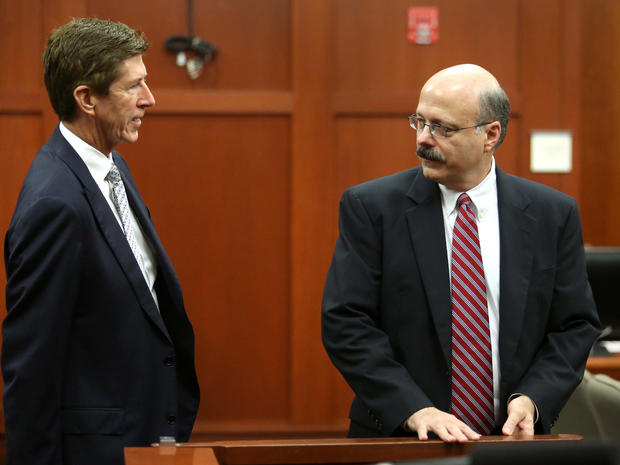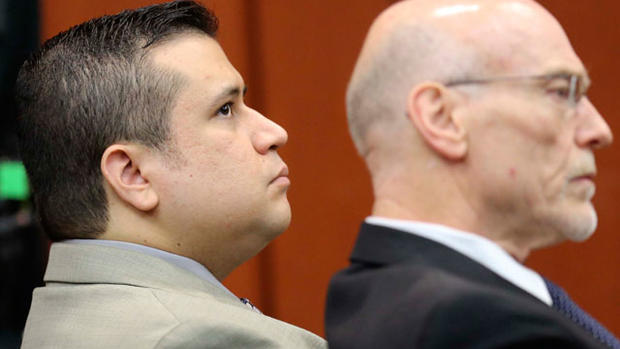George Zimmerman Trial: Details about jury candidate pool surface as questioning enters second round
(CBS/AP) SANFORD, Fla. - Prosecutor Bernie de la Rionda asked a group of 40 potential jurors in the George Zimmerman trial Wednesday whether they have been victims of crime, whether any were neighborhood watch volunteers and whether they believe people "have the right to take the law into their own hands."
PICTURES: George Zimmerman in court
READ: Trayvon Martin Shooting: A timeline of events
Zimmerman, 29, is charged in the shooting death of unarmed Florida teen Trayvon Martin during an altercation in a Sanford, Fla. gated community last year. A former neighborhood watch captain, Zimmerman claims he acted in self-defense.
The 40 candidates were chosen to move on to second round of questioning after more than a week of jury selection proceedings, during which attorneys questioned potential jurors about their knowledge of the high-profile case and exposure to publicity. Despite the pre-trial media reports, the group of 40 potential jurors chosen for further questioning said they could focus on testimony provided in the courtroom.
Of the four candidates who said they had been victims of violent crime, one said she wasn't sure she could "leave it outside the courtroom" during the trial.
The woman said she was a victim of a crime "very similar" to the case, the Orlando Sentinel reports.
"It's always in my mind," she said.
Potential jurors said they didn't believe it was appropriate for people to act as law enforcers, and none had experience with neighborhood watch groups.
The candidates shared personal details about their lives during Wednesday's questioning. Several were involved with rescuing animals, and the pool included a competitive arm-wrestler and a man who enters barbecue competitions.
The 40 potential jurors represent a cross-section of people from all walks of life and ethnic backgrounds who have varying levels of familiarity with the case's basic facts. The jury candidates include people who have lived in Massachusetts, Texas and Illinois, former military members, some at least two who have served as a jury foreperson, the Orlando Sentinel reports.
Twenty-seven of the 40 potential jurors are white, seven are black, three are mixed race and three are Hispanic. Twenty-four are women and 16 are men.
The racial and ethnic makeup of potential jurors is relevant, prosecutors say. They have argued that Zimmerman profiled Trayvon Martin when he followed the black teen last year as Martin was walking back from a convenience store to the house of his father's fiancee.
Martin's death prompted public outrage around the nation, with some accusing Sanford police of failing to investigate the shooting thoroughly from the beginning because of Martin's race and because he was from the Miami area.
Circuit Judge Debra Nelson read Zimmerman's second-degree murder charge before the group.
"The object is to obtain a jury who will impartially try this case based on the evidence presented in the courtroom," Nelson told the potential jurors.
Nelson said attorneys for both the prosecution and the state would be allowed to ask much broader questions in the second round than they did in the first. Wednesday morning, de la Rionda asked individual jurors about how long they have lived in Florida; whether they supervised workers; their hobbies; if they had previously served on juries; if they're married; and what their spouses did for a living. He also warned jurors that they would have to forget about anything they knew about the case previously and base their information only on what they heard in the courtroom.
"What you heard and saw anywhere outside the courtroom can't factor into your decision," he said. "What you saw on TV or on the Internet or read or what the media said is completely irrelevant."
De la Rionda asked a potential juror, E-40, to explain why she felt opinions and assumptions should not play a role in determining a verdict.
"We have to check our personal values, beliefs and assumptions," the potential juror said. "I think we have to hold others accountable also, and challenge them if we think we hear or see those biases coming out."
Nelson said last week that once pared down, the final jury would be sequestered throughout the two-to-four-week trial to protect it from outside influence. Attorneys are in search of six jurors and four alternates to sit on the panel.
Complete coverage of the George Zimmerman-Trayvon Martin case on Crimesider

